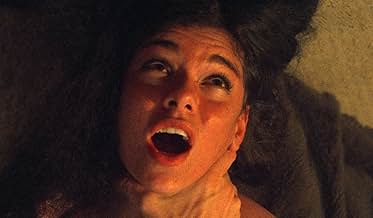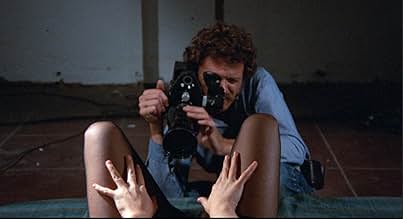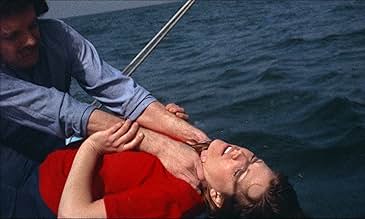A struggling photographer takes a job in the porn industry. Unable to handle the degradation, he begins murdering young women to vent his frustrations.A struggling photographer takes a job in the porn industry. Unable to handle the degradation, he begins murdering young women to vent his frustrations.A struggling photographer takes a job in the porn industry. Unable to handle the degradation, he begins murdering young women to vent his frustrations.
- Director
- Writer
- Stars
- Director
- Writer
- All cast & crew
- Production, box office & more at IMDbPro
Featured reviews
I am guessing I was at the same New Beverly Cinema screening as the other commenter, where the audience went from confused and generally amused to teetering on the brink of rioting. As has been previously stated, this is not a horror film. It is incredibly unique, however - the kind of bastard love-child of Antonioni, "My Dinner With Andre," "Death Bed: The Bed That Eats," "Peeping Tom," and the novels of Bruce Wagner. At the very least, it surely deserves a DVD release, for the jaw-dropping final shot alone.
There's a good Psychotronic article in here somewhere - feminist manifesto sold as a genre film, with a cast and crew that came out of nowhere, nailed the film, then all but vanished. At the very least this movie could be programmed with the likes of "Sorority House Massacre" on some kind of "lesser known Psychotronic women" bill.
Worth seeking out, but be warned: It's not a horror film, it's molasses slow, and it's one of film's true buried curiosities.
There's a good Psychotronic article in here somewhere - feminist manifesto sold as a genre film, with a cast and crew that came out of nowhere, nailed the film, then all but vanished. At the very least this movie could be programmed with the likes of "Sorority House Massacre" on some kind of "lesser known Psychotronic women" bill.
Worth seeking out, but be warned: It's not a horror film, it's molasses slow, and it's one of film's true buried curiosities.
I just saw this at the New Beverly Cinema in Los Angeles on a double bill with "Don't Go In the House". The print they showed had "TWISTED THROATS" as its title. I wonder how many times this film was released in theaters under various titles. The premise sounded promising, but turned out to be long and very dull --- full of non-stop rambling dialog and shots of people walking around slowly that went on and on forever and ever. This is no horror movie!!! It's basically "Maniac" without the gore or killings. There are some nice shots or early 70's Los Angeles --- especially when it shows old closed down strip clubs of yesteryear like The Pink Pussycat.
"Hollywood 90028" follows Mark, a dejected cinematographer in Los Angeles struggling to make it in the business, relegated to shooting porno loops to get by. Plagued by loneliness and alienated from his peers, Mark finds friendship in a prostitute named Michele, but his demons ultimately begin to surface in violent ways.
This obscurity written and directed by Christina Hornisher has often been branded as a rediscovered lost film, as it was hardly released for nearly four decades and unknown to even the most diehard exploitation enthusiasts. It is a unique film with a strong psychological dimension that is unfortunately never fully realized.
The character of Mark is wracked with guilt over the death of his infant brother when he was a child, and is a lonely and withdrawn man for reasons that are apparent. However, the screenplay lacks the connective tissue that could potentially make sense of his pathology. His character in some ways reminded me of Travis Bickle in Martin Scorsese's "Taxi Driver", released a few years later, though Mark's ultimate drive for murder lacks a tangible underpinning.
The film is unusual in that, despite largely dealing with masculine rage, it was written and directed by a woman, though it does also offer some exploration of female objectification and the realities of sex work through the character of Michele, another troubled soul who finds some kinship with Mark. It is a langorously-paced affair all around, with some dizzyingly surreal captures of Los Angeles's grimmer underbelly, which is certainly a plus.
As the story ramps up to its inevitable conclusion, there is a fair share of tension and a tragic last punch at the audience, but when the credits rolled, as a viewer, I felt ultimately empty. Perhaps this was an intentional choice, or maybe (and more likely) an incidental element of the film stemming from its spacey quality. All in all, I found it to be a character study that doesn't quite work, but its attempts at exploring a number of psychological themes are valiant. 6/10.
This obscurity written and directed by Christina Hornisher has often been branded as a rediscovered lost film, as it was hardly released for nearly four decades and unknown to even the most diehard exploitation enthusiasts. It is a unique film with a strong psychological dimension that is unfortunately never fully realized.
The character of Mark is wracked with guilt over the death of his infant brother when he was a child, and is a lonely and withdrawn man for reasons that are apparent. However, the screenplay lacks the connective tissue that could potentially make sense of his pathology. His character in some ways reminded me of Travis Bickle in Martin Scorsese's "Taxi Driver", released a few years later, though Mark's ultimate drive for murder lacks a tangible underpinning.
The film is unusual in that, despite largely dealing with masculine rage, it was written and directed by a woman, though it does also offer some exploration of female objectification and the realities of sex work through the character of Michele, another troubled soul who finds some kinship with Mark. It is a langorously-paced affair all around, with some dizzyingly surreal captures of Los Angeles's grimmer underbelly, which is certainly a plus.
As the story ramps up to its inevitable conclusion, there is a fair share of tension and a tragic last punch at the audience, but when the credits rolled, as a viewer, I felt ultimately empty. Perhaps this was an intentional choice, or maybe (and more likely) an incidental element of the film stemming from its spacey quality. All in all, I found it to be a character study that doesn't quite work, but its attempts at exploring a number of psychological themes are valiant. 6/10.
As teens in the mid to late 1970s, we often went to the drive-in for our weekend's entertainment, loaded with six packs (drinking age was 18 in Ohio for some beer). One night, we were pretty toasted and tired for the third movie on the bill called 'The Hollywood Hillside Strangler'. Somehow, I fought through the haze and noticed the peculiar artiness of this otherwise typical serial killer story. The characters were real, the dialogue was strong, although the atmosphere was on the dreamy side. Not David Lynch's Los Angeles, but I would discover that much later. I was really surprised that there was art in this exploitation flick and some years later searched for this film. Despite many resources, I couldn't identify it. I thought it was a Ray Dennis Steckler film, but no, not quite. Finally when I found this movie called "insanity' on the print I watched, I got the reward of seeing this drive-in classic again. The writing is still quite original and the direction, tone, and style all are wildly successful compared to other genre films in this budget range.
Admittedly, I had some minor expectations for "Hollywood 90028", what with this being an ancestor of misogynist slashers like "Maniac" and "Don't Go in the House", and simultaneously being the work of a female writer/director. But the sad truth is that the film fully deserves its current obscurity status. The story of an ambitious cameraman not being able to find decent assignments in Hollywood, and his job of shooting sleazy adult movies driving him to strangle random women, certainly holds potential, but it's dull and amateurish beyond comparison. Some sequences, like the family-photos montage during the opening credits, indicate that director Christina Hornisher really had a tragic story to share, but she lacks the financial means - and the talent - to make it happen. The film is ugly to look at, poorly acted and edited even worse, and it's full of padding footage of the lead actor pointlessly driving around in LA's sleaziest red-light districts.
Did you know
- TriviaDick Glass portrays an almost identical character in the 1971 film "The Erotic Director" and the location used as his character's studio was the same in both movies.
- GoofsAny tracking shots, particularly driving scenes, the reflection of the camera crew van's can be seen several times through the film.
- ConnectionsFeatured in The Film Lost to Time (2024)
Details
- Release date
- Country of origin
- Language
- Also known as
- The Hollywood Hillside Strangler
- Filming locations
- Los Angeles, California, USA(main location)
- Production company
- See more company credits at IMDbPro
Contribute to this page
Suggest an edit or add missing content





















